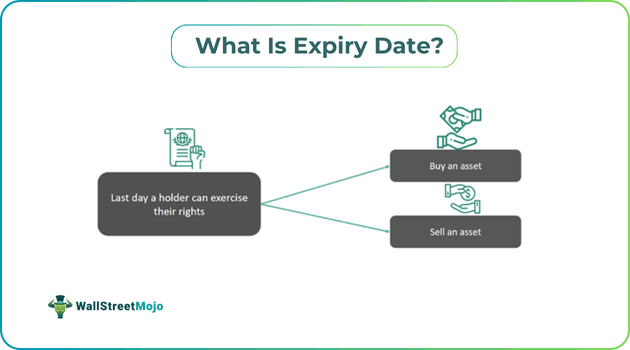Table of Contents
Expiry Date Meaning
An expiry date refers to the date on which the derivative contract comes to an end. This date is also known as the expiration date or maturity date. It is an important date because it marks the end of the contract and the settlement of the underlying asset, which could be a stock, commodity, currency, or other financial instrument.

For example, in the case of a futures contract, the expiry date is the last day on which the holder of the contract can buy or sell the underlying asset at the specified price. If the contract is not closed out or rolled over before the maturity date, the holder must either take delivery of the asset or settle the contract in cash. In options trading, the maturity date determines the last day on which the holder can exercise their right to buy or sell the underlying asset at the strike price specified in the contract. If the option is not exercised by the maturity date, it becomes worthless.
Key Takeaways
- The expiry date is the date on which a derivative contract reaches its termination, and all the rights and obligations associated with the contract come to an end.
- It signifies the conclusion of a derivative contract and the settlement of the underlying asset, which may be a financial instrument, commodity, stock, etc.
- Contrary to maturity date, the shelf life of a product is an indication of the estimated time period within which it will remain safe and maintain its quality.
- Whereas best before date is a quality indicator that shows when a product might start to lose its quality characteristics
Expiry Date Explained
The expiry date of a derivative contract is the date on which the contract comes to an end. At this point, the contract is either settled, rolled over, or closed out.
The maturity date is an essential element of a derivative contract, as it marks the point at which the contract's terms are completed, and the holder of the contract must take action to either exercise their rights or settle the contract in some other way.
There are several types of derivative contracts, each with its own specific expiration date rules. Here are some examples:
- Futures Contracts: Futures contracts have a set maturity date that is specified when the contract is created. The maturity date for futures contracts can vary, but they are usually standardized across the exchange on which they are traded. When the maturity date is reached, the holder of the contract must either take delivery of the underlying asset or settle the contract in cash.
- Options Contracts: Options contracts also have an expiry date, which is the last day on which the holder can exercise their right to buy or sell the underlying asset at the specified price. The derivative expiry date for options contracts can vary, but they are usually standardized across the exchange on which they are traded. If the option is not exercised by the maturity date, it becomes worthless.
- Swap Contracts: Swap contracts are over-the-counter (OTC) contracts that don't have a fixed expiry date. Instead, the contract's termination date is negotiated between the two parties at the time the contract is created. This date can be adjusted during the contract's life.
Thus, the maturity date is a critical consideration for traders who enter into derivative contracts, as it determines when the contract must be settled or rolled over. Traders need to be aware of the maturity date when entering into a derivative contract, as it can have a significant impact on the profitability of the trade.
Examples
Let us look at some examples to understand the concept better:
Example #1
Suppose a trader holds a futures contract and fails to close out or roll over the contract before the maturity date. They may be forced to take delivery of the underlying asset, which can be costly if they are not able to dispose of it at a favorable price. Similarly, if an options contract is allowed to expire without being exercised, the holder loses their right to buy or sell the underlying asset at the specified price.
Example #2
In August 2011, Duluth Metals Limited issued special warrants to shareholders of record, which were automatically converted into common shares of its wholly-owned Canadian subsidiary, Duluth Exploration Limited (DEL). Given that DEL is a private company and does not conduct stock exchange trading, these warrants represent a stage in between the issuance of freely trading shares. By January 18, 2013, DEL must complete a technical report that complies with NI 43-101 and a liquidity event in order for the special warrants to expire and DEL to continue as a subsidiary. Due to the IPO and market conditions, as well as delays in obtaining drilling permits for DMC Properties, DEL has extended the deadline to July 31, 2013. On September 24, 2012, drilling on DMC Properties got underway.
Expiry Date vs Best Before vs Shelf Life
The differences between the expiry date vs. best before vs. shelf life is as follows:
| Expiry Date | Best Before | Shelf Life |
|---|---|---|
| The expiry date is a safety indicator, indicating when a product may no longer be safe to use or consume. | The best-before date is a quality indicator, indicating when a product may begin to lose its quality attributes. | The period that an item can be kept in storage before it loses its suitability for use, selling, or consumption. |
